

A Lifetime of Intellectual Stimulation Staves Off Dementia. Turning to brainy pursuits in later years also helps delay the onset of the dreaded condition, according to a new study.
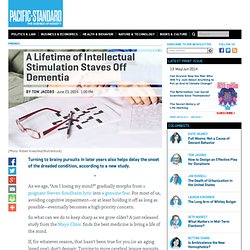
As we age, “Am I losing my mind?” Gradually morphs from a poignant Steven Sondheim lyric into a genuine fear. For most of us, avoiding cognitive impairment—or at least holding it off as long as possible—eventually becomes a high-priority concern. So what can we do to keep sharp as we grow older? A just-released study from the Mayo Clinic finds the best medicine is living a life of the mind. If, for whatever reason, that hasn’t been true for you (or an aging loved one), don’t despair: Turning to more cerebral leisure pursuits late in life can also help in a big way.
“Lifetime intellectual enrichment might delay the onset of cognitive impairment and be used as a successful preventative intervention to reduce the impending dementia epidemic,” writes a research team led by Mayo Clinic radiologist Prashanthi Vemuri. These results lead to a clear policy recommendation. Grand-parenting keeps wheels turning.
The researchers however have a warning about over-using the generous nature of grandparents noting that women who cared for grandchildren five or more days a week had significantly slower processing speed and planning scores, possibly because they felt exhausted.

Results came from the Women’s Healthy Ageing Project (WHAP) a longitudinal prospective study of more than 20years in Melbourne women. Director of WHAP, Associate Professor Cassandra Szoeke from the Faculty of Medicine, Dentistry and Health Sciences, said it is important to study the impact of grand-parenting on cognition. “Social engagement, positive mood enhancement, ongoing learning and mental stimulation have all been shown to reduce the likelihood of getting Alzheimer’s Disease. These are all important elements for warding off dementia and grand- parenting contains all these components,” she said. Antidepressant may slow Alzheimer’s disease. A commonly prescribed antidepressant can reduce production of the main ingredient in Alzheimer’s brain plaques, according to new research at Washington University School of Medicine in St.
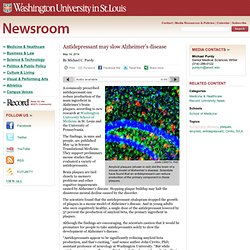
Louis and the University of Pennsylvania. The findings, in mice and people, are published May 14 in Science Translational Medicine. They support preliminary mouse studies that evaluated a variety of antidepressants. Brain plaques are tied closely to memory problems and other cognitive impairments caused by Alzheimer’s disease. Stopping plaque buildup may halt the disastrous mental decline caused by the disorder. Beyond the brain: vascular changes in the neck may play role in Alzheimer’s. Buffalo, N.Y. – Studies on Alzheimer’s disease and other forms of dementia have long focused on what’s happening inside the brain.

Now an international research team studying Alzheimer’s and mild cognitive impairment is reporting potentially significant findings on a vascular abnormality outside the brain. For a healthy brain, don't let the trash pile up. Public release date: 21-Jul-2013 [ Print | E-mail Share ] [ Close Window ] Contact: Barbara McMakinnindspressteam@ninds.nih.gov 301-496-5751NIH/National Institute of Neurological Disorders and Stroke Recycling is not only good for the environment, it's good for the brain.
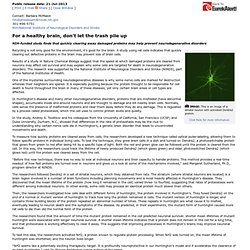
A study using rat cells indicates that quickly clearing out defective proteins in the brain may prevent loss of brain cells. Results of a study in Nature Chemical Biology suggest that the speed at which damaged proteins are cleared from neurons may affect cell survival and may explain why some cells are targeted for death in neurodegenerative disorders. One of the mysteries surrounding neurodegenerative diseases is why some nerve cells are marked for destruction whereas their neighbors are spared. Major step toward an Alzheimer’s vaccine. A team of researchers from Université Laval, CHU de Québec, and pharmaceutical firm GlaxoSmithKline (GSK) has discovered a way to stimulate the brain’s natural defense mechanisms in people with Alzheimer’s disease.
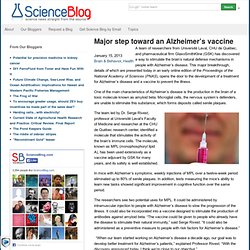
This major breakthrough, details of which are presented today in an early online edition of the Proceedings of the National Academy of Sciences (PNAS), opens the door to the development of a treatment for Alzheimer’s disease and a vaccine to prevent the illness. One of the main characteristics of Alzheimer’s disease is the production in the brain of a toxic molecule known as amyloid beta. Microglial cells, the nervous system’s defenders, are unable to eliminate this substance, which forms deposits called senile plaques. The team led by Dr. Green tea extract interferes with the formation of amyloid plaques in Alzheimer's disease. Researchers at the University of Michigan have found a new potential benefit of a molecule in green tea: preventing the misfolding of specific proteins in the brain.

The aggregation of these proteins, called metal-associated amyloids, is associated with Alzheimer's disease and other neurodegenerative conditions. Scientists Work to Detect Alzheimers Disease Earlier. New Imaging Method Detects Alzheimer's Risk Years before the Disease Strikes. Paul Thompson Using a new imaging method that screens the brain’s connections, UCLA scientists have discovered a common abnormality in our genetic code that increases the risk of Alzheimer’s years before the disease strikes.

Scientists at UCLA have discovered a new genetic risk factor for Alzheimer’s disease by screening people’s DNA and then using an advanced type of scan to visualize their brains’ connections. Alzheimer’s disease, the most common cause of dementia in the elderly, erodes these connections, which we rely on to support thinking, emotion and memory. Sexual experience restores age-related decline i... [Hippocampus. 2013. Does Being a Bookworm Boost Your Brainpower in Old Age? Learning Digital Photography Improves Cognitive Function in Older Adults › The Next Regeneration. Proliferation of amyloid-β42 aggregates occurs through a secondary nucleation mechanism. Author Affiliations Edited * by William A.
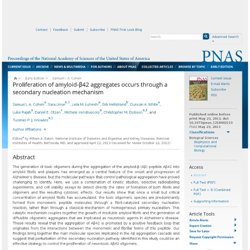
Eaton, National Institute of Diabetes and Digestive and Kidney Diseases, National Institutes of Health, Bethesda, MD, and approved April 12, 2013 (received for review October 22, 2012) Abstract. Older Brain Is Willing, but Too Full for New Memories.